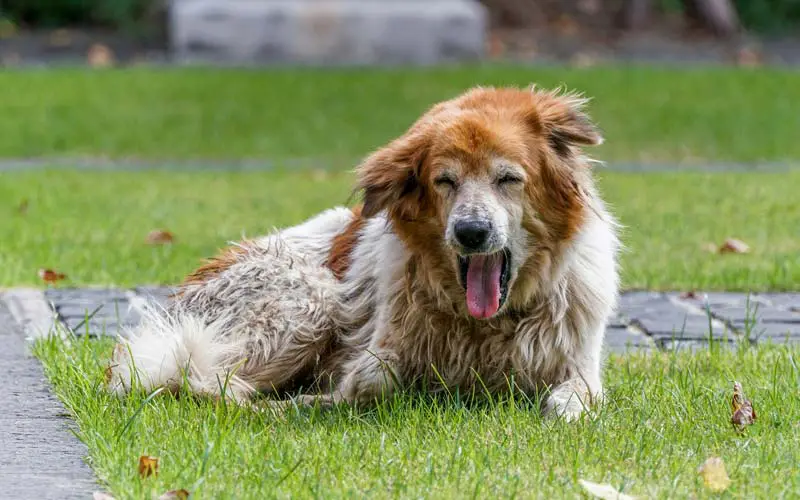Hearing your dog cough and gag can be both alarming and puzzling. Is it just a harmless reaction to something in the environment, or could it signal a more serious health issue? These symptoms are relatively common in dogs and may result from a range of causes, including respiratory infections, throat irritation, allergies, or even heart conditions.

Understanding the reasons behind this behavior is crucial for determining whether to monitor your pet at home or seek immediate veterinary care. This article will guide you through the potential causes, what signs to watch for, and how to address the issue to ensure your dog’s health and well-being.
1. Understanding the Behavior
Coughing vs. Gagging
Coughing and gagging are distinct behaviors, though they often occur together, making it essential for dog owners to differentiate between the two.
- Coughing: This is typically a reflex to clear irritants, mucus, or foreign materials from the airways. It is characterized by a sharp, forced exhalation and may or may not be productive (bringing up mucus).
- Gagging: Gagging is more closely associated with the throat and involves a retching sound, often resembling a precursor to vomiting. Unlike vomiting, gagging does not involve the expulsion of stomach contents.
These two behaviors frequently overlap. For instance, a dog may cough due to irritation in its airway, which then leads to throat inflammation and triggers gagging. This sequence is common in conditions like kennel cough, where the harsh coughing irritates the throat.
Key Signs to Observe
When determining whether your dog’s coughing and gagging are cause for concern, pay close attention to the following:
Frequency: Occasional episodes may be harmless, but persistent or worsening symptoms could indicate a deeper issue.
Sound: A “goose honk” sound often points to kennel cough, while wet-sounding coughs might suggest fluid in the lungs, as seen in pneumonia or heart disease.
Accompanying Symptoms:
- Lethargy or decreased energy levels.
- Loss of appetite or reluctance to eat.
- Breathing difficulties, such as wheezing or rapid breathing.
Documenting the frequency, sound, and any related symptoms will provide your veterinarian with valuable information to pinpoint the underlying cause.
By understanding these behaviors and their distinctions, you can better monitor your dog’s condition and act swiftly if the need arises.

2. Common Causes of Coughing and Gagging in Dogs
Understanding the potential reasons behind a dog’s coughing and gagging can help owners identify when to seek veterinary care. Below are the most common causes and their associated symptoms.
1. Respiratory Issues
- Kennel Cough: A highly contagious respiratory infection often causing a loud, dry, “goose honk” cough. Dogs may also gag after coughing due to throat irritation.
- Pneumonia: Typically results in a wet-sounding cough, fever, and lethargy. Severe cases may involve difficulty breathing.
- Chronic Bronchitis: This condition involves persistent coughing and may progress if untreated.
Respiratory issues vary in severity, and early diagnosis is key to effective treatment.
2. Throat Irritants or Foreign Bodies
Smoke, strong scents, or small objects stuck in the throat can trigger coughing and gagging as the dog attempts to clear the irritation. If a foreign object is the culprit, immediate veterinary attention is necessary to avoid choking or airway damage.
3. Allergies
Seasonal or environmental allergens like pollen, mold, or dust can cause respiratory irritation in dogs. Symptoms may include sneezing, coughing, and watery eyes. Dogs with allergies may experience chronic coughing if exposed to the irritant for extended periods.
4. Heart Conditions
Conditions such as congestive heart failure can cause coughing due to fluid buildup around the lungs, resulting in difficulty breathing. This type of cough often worsens at night or when lying down. These symptoms warrant immediate veterinary attention.
5. Parasitic Infections
- Heartworm: This serious condition can cause coughing, lethargy, and exercise intolerance.
- Lungworm: A less common parasite that leads to respiratory issues, including coughing and wheezing.
Both conditions require prompt diagnosis and specialized treatment.
6. Laryngeal Paralysis
This condition, most often seen in older dogs, occurs when the muscles controlling the larynx weaken. It leads to loud panting, coughing, and gagging, especially during exercise or excitement. Surgery may be necessary for severe cases.
Recognizing these causes and monitoring symptoms can help dog owners take timely action, potentially preventing complications. If in doubt, consult a veterinarian for a thorough evaluation.

3. When to Be Concerned
Recognizing when coughing and gagging in dogs is a sign of a serious issue is essential for ensuring timely care. While occasional coughing may be harmless, persistent or severe symptoms often indicate an underlying health problem that requires veterinary attention.
Red Flags
If your dog exhibits any of the following, it’s time to consult a veterinarian:
- Persistent Coughing: Coughing that lasts beyond 48–72 hours, even if mild, may suggest a respiratory infection or other underlying issue that needs treatment.
- Breathing Difficulty: Labored or noisy breathing, open-mouth breathing, or wheezing should not be ignored, as these can signal respiratory distress.
- Lethargy: A noticeable decrease in energy or responsiveness often indicates your dog isn’t feeling well.
- Appetite Loss: Reduced interest in food or water can point to illness and exacerbate dehydration risks.
Emergency Symptoms
Immediate veterinary care is required if your dog shows any of the following:
- Cyanosis: A bluish tint to the gums or tongue signals oxygen deprivation and requires urgent attention.
- Fainting or Collapse: These symptoms may indicate heart or respiratory failure.
- Blood in Mucus: Coughing up blood-streaked mucus could suggest severe airway irritation, trauma, or advanced infection.
Importance of Early Intervention
Promptly addressing these symptoms can prevent complications and ensure the best outcome for your dog. For example:
- Treating infections early minimizes the risk of pneumonia.
- Identifying heartworm before advanced stages improves treatment success.
- Removing foreign objects quickly reduces airway damage.
By staying vigilant and acting on concerning signs, you can help protect your dog’s health and comfort. When in doubt, it’s always better to consult your veterinarian.

4. Diagnostic and Treatment Steps
If your dog is coughing and gagging persistently, a veterinary evaluation is essential to identify the cause and determine the appropriate treatment. Here’s what you can expect during the process:
Veterinary Evaluation
- Physical Examination: The vet will assess your dog’s overall health, listen to its lungs, and check its throat for signs of irritation or foreign objects.
- Imaging: X-rays or ultrasound may be used to detect issues such as fluid in the lungs, foreign bodies, or heart abnormalities.
- Lab Tests: Blood work can reveal infections, allergies, or parasites like heartworm or lungworm. A tracheal wash or throat swab might also be performed to diagnose respiratory infections.
Common Treatments
Once the cause is identified, treatment options may include:
- Antibiotics: Prescribed for bacterial infections like kennel cough or pneumonia.
- Anti-Parasitic Medications: Used to treat heartworm or lungworm infestations.
- Surgery: Necessary to remove foreign objects or address severe conditions like laryngeal paralysis.
- Supportive Care: Oxygen therapy or medications to reduce inflammation and soothe irritated airways.
Timely treatment not only resolves the current issue but also prevents complications like chronic respiratory damage or organ failure.
Home Care Tips
In addition to veterinary care, these measures can improve your dog’s comfort and recovery:
- Clean Environment: Keep your home free of smoke, dust, and strong fragrances that can irritate your dog’s respiratory system.
- Hydration: Encourage your dog to drink water to stay hydrated and help loosen mucus.
- Soothing Remedies: If recommended by your vet, try steam therapy (e.g., running a hot shower and letting your dog breathe the moist air) to ease airway irritation.
- Rest: Limit strenuous activities to avoid worsening respiratory strain during recovery.
Early diagnosis and a combination of professional and at-home care can make a significant difference in your dog’s health and well-being. Regular communication with your veterinarian will ensure that treatment plans are tailored to your dog’s specific needs.

5. Preventive Measures
Preventing coughing and gagging in dogs is essential for maintaining their overall health and well-being. By implementing key preventive strategies, you can reduce the risk of these symptoms and ensure early intervention if problems do arise.
Vaccinations
One of the most effective ways to protect your dog against respiratory issues is through vaccinations. Ensuring your dog is up-to-date on vaccines, such as those for kennel cough (Bordetella bronchiseptica) and other common respiratory diseases, can significantly lower the risk of infection. Kennel cough, while generally mild, can progress to more severe conditions if not prevented or treated promptly. Consult with your veterinarian to determine the appropriate vaccination schedule based on your dog’s age, breed, and lifestyle.
Safe Environment
Maintaining a clean and safe living environment is crucial for preventing respiratory issues in dogs. This includes:
- Minimizing Exposure to Smoke: Cigarette smoke and other pollutants can irritate the airways and increase the risk of chronic cough and respiratory conditions.
- Avoiding Chemicals: Harsh cleaning products and household chemicals can also trigger coughing and gagging. Use pet-safe alternatives and ensure good ventilation.
- Limiting Allergens: Regularly clean bedding, and consider air purifiers to reduce allergens like dust and pollen that may contribute to respiratory distress.
Routine Checkups
Routine veterinary checkups are essential for early detection and prevention of health issues. Annual exams can help catch potential problems such as heart disease, lungworm, or other conditions that might not show symptoms immediately. Your vet can also discuss vaccination schedules, update parasite prevention plans, and offer guidance on maintaining a healthy environment for your dog.
By taking preventive measures such as vaccinations, maintaining a safe and clean environment, and scheduling regular vet visits, you can minimize the risk of coughing and gagging in your dog. Early intervention, combined with consistent care, ensures a long, healthy life for your furry friend.

Conclusion Why Is My Dog Coughing and Gagging?
Coughing and gagging in dogs can range from minor annoyances to indicators of serious health concerns. Understanding the differences between these behaviors and recognizing the key signs to watch for is essential for every dog owner. From common causes like respiratory infections, allergies, and heart conditions to preventive measures such as vaccinations and safe environments, taking proactive steps can ensure your dog’s comfort and long-term health.
When your dog exhibits persistent or severe coughing and gagging, seeking prompt veterinary evaluation is crucial. Early intervention, combined with appropriate treatment and consistent home care, can prevent complications and support your pet’s recovery. By maintaining regular checkups and keeping your dog’s environment clean and safe, you can minimize the risk of respiratory issues and other health problems.
Don’t hesitate to reach out to your veterinarian if you’re ever concerned about your dog’s health. Your vigilance and timely action can make all the difference in ensuring a long, healthy, and happy life for your furry friend.